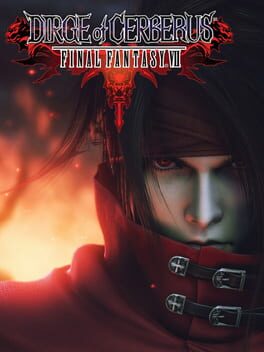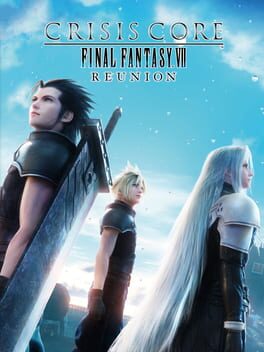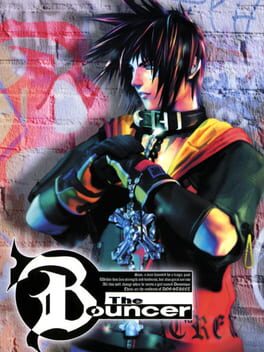SerphKun
15 reviews liked by SerphKun
Final Fantasy XVI
2023
This review contains spoilers
HE A LITTLE CONFUSED, BUT HE GOT THE SPIRIT:
Much and more has been said about all of the things Final Fantasy XVI gets wrong (including on this very site by writers who I respect, who I consider friends and who can probably voice their thoughts and make points in a more captivating and eloquent way than I can): the unfair-at-absolute-best treatment of its female characters, the missteps with its political storytelling that indicate anything and everything from a well-intentioned carelessness to an active othering of refugees and oppressed peoples, the conscious and gleeful lack of diversity in characters’ ethnicities and races… you get the picture.
I’m not gonna talk about any of that stuff in-depth though, partially because I feel as if I don’t have anything meaningful to add to the already-existing discussions and partially because I think that a lot of this stuff isn’t really unique to XVI within the context of Final Fantasy. XVI’s sexism didn't get under my skin the way Final Fantasy VII’s infamous slap fight or Final Fantasy XV’s nigh-hostile treatment of any and all female characters did… and honestly, the laundry list of XVI’s issues are pretty much equally present in the current-day darling of the franchise, Final Fantasy XIV, which is also developed and maintained by Creative Business Unit 3. I’m not bringing up XIV specifically as a “gotcha!” (I’ve been playing it since 2018 and been a regular since 2021, and I have two different FFXIV tattoos on my wrist), but because a lot of the way I look at XVI is rooted in the way I look at XIV.
XIV routinely treats its women like shit (hell, Jill Warrick isn’t even the first Shiva penned by Maehiro to get fucked out of a place in the story while acting as a crutch for her love interest’s character development). XIV has a serious problem with xenophobia and portraying brown people as thinly-veiled caricatures or regarding them with a thinly-veiled hostility. XIV shames victims of imperialism for wanting to give their oppressors their comeuppance, dehumanizes refugees from said imperialized countries, and unironically uses gimmick characters to act as spokespersons for trickle-down economics. Hell, it does most of this shit within the span of a single patch story.
But like, honestly, none of that is particularly relevant to why XVI manages to speak to me in spite of itself. I’m gonna talk about XIV again, are you ready?
Final Fantasy XIV is a game I love, it’s a game that’s important to me, and in many ways it’s a game that has impacted my life in a way few other games have. It also frequently leaves me feeling frustrated, unseen, or actively disregarded. While the Dark Knight questline is probably the single piece of written word that’s resonated with me the most and certain characters such as the aforementioned Estinien give a voice to aspects of my worldview and morality I often feel are understood, more often than not I feel like Final Fantasy XIV wants me to feel ashamed for being who and how I am. The again-aforementioned questline where an angry mob is compared to their oppressors for ganging up on a member of an occupying military force, the almost exclusive emphasis on empathy and understanding of those who have wronged you no matter their crimes (again, with Estinien and the recently-added Zero being notable exceptions), the fucking ending to Endwalker framing the founder of a fascist state as a noble hero after spending a long time earlier in the expansion demonstrating the horrors of the well-oiled machine he designed…
I don’t know, dude, I’m just not wired like that. Some people are and I’m glad they find meaning in it, but time and time again Final Fantasy XIV feels like it doesn’t really welcome anybody who doesn’t have a boundless fount of empathy and compassion towards evildoers.
And then there’s the fact that as an MMO Final Fantasy XIV must maintain a status quo and cannot ever meaningfully change its world without uprooting the foundations upon which it’s built (which - credit where credit is due - it did in fact pull off once). The Warrior of Light fights to maintain a neoliberal utopia in which the corpses of the poor are left to rot outside the walls of Ul’dah and Ishgard remains defined by its horrific class disparity between the Brume and the Pillars. Final Fantasy XIV is about hope for the future, but that future can never and will never come. Pat yourselves on the back, kids, you’ve just contracted Ala Mhigan refugees to work in the salt mines which will be fantastic for the economy.
Okay! I’m gonna talk about Final Fantasy XVI now. You know Hugo Kupka, the guy that looks like he’s walked out of the Apple store with an iPhone 12 in his mouth? I fucking love Kupka; he’s a really fascinating character to me and I think he’s the most strongly-written as an individual character of all of XVI’s villains. Kupka has a pretty typical Man-Pain motivation (unfortunately earned by the unearned death of Benedikta Harman, one of the earliest examples of XVI’s latent misogyny) of wanting to avenge his dead lover, with his definition of vengeance being a reign of terror over the Hideaway (a commune of runaway slaves run by his archnemesis Cid Telamon, who he believes responsible for Benedikta’s death).
What makes Kupka interesting to me though is that Benedikta probably never actually cared about him and appeared to value him exclusively as a political pawn, using intimacy to get him wrapped around her finger while her true affections ironically lay with Cid. There’s a unique sort of tragedy to Kupka with that in mind: all of his pain, anger and all of the blood spilled in the name of his vengeance was all in the name of a woman who in all likelihood never loved him and only used him as a means to an end while her heart lay with another man. It’s interesting! He’s fascinating and a well-executed if not unconventional example of a tragic, sympathetic villain.
Our protagonist Clive though? Clive doesn’t give a shit about any of that. When confronting Kupka as not only his own form of revenge but to stop Kupka’s attacks against Clive’s current and former homes, the two share plenty of verbal blows and monologue at each other, pretty typical JRPG stuff… until Clive highlights the hypocrisy in Kupka’s logic and makes painfully clear that Kupka didn’t give a damn about any of the pain he caused as compensation for his own pain, considering the majority of the people he killed were entirely innocent and that Clive killed Benedikta only to keep her from killing innocent people too.
He’s a hypocrite who will not offer even a smidgen of the respect to his own victims that he demands, and Clive makes it agonizingly clear that Kupka will get “no pity from me - no pity and no mercy.”
Clive is full of righteous anger, a fury fueled by the souls of the friends he’s lost to Kupka’s actions. He has nothing but spite and hostility towards Kupka, he has no intentions of understanding or sparing a single thought towards Kupka’s own pain, and he’s framed as wholly and entirely right for doing so. There are a lot of examples of this in XVI, from Jill brutally murdering the abusive father figure who forced her to act as a weapon of war, all the way to Charon gouging out the eye of a fellow trader in compensation for the eye he took from her years and years ago. None of it is ever framed as anything but a justified and cathartic experience for the one who seeks revenge, nor are we ever expected to really sympathize with any of the people who had caused harm to the characters XVI follows. Whenever news of Kupka’s death reaches the Hideaway, they rejoice not only for justice served but for the threat that no longer lingers over their heads.
After years and years of feeling misunderstood and othered by XIV, XVI feels like a breath of fresh air and some indirect form of acceptance from FF’s writing - especially since XVI’s story is pretty specifically about revolutionary violence as a means to deconstruct oppressive power structures, another topic that is really near and dear to my heart. Ultima and the Mothercrystals can act as a metaphor for capitalism, for colonialism, for religious oppression, or all three depending on the angle from which you view them and the scene at hand, and the game never really meaningfully questions or doubts the righteousness of revolt in the face of being held underfoot. I think XVI lives and dies by its politics, and considering Tactics and XII don’t really do that much for me I’m pleasantly surprised by the fact that I find XVI’s politics engaging and resonant enough to make up for the shoddy writing elsewhere.
Which… yeah, dude, towards the end the game starts trying to work in a bunch of shounen tropes about the power of wills and friends and loved ones giving you strength and that shit sucks dude, God, earlier in the game lower-class people coming together to bring about societal change seemed like a pretty opaque portrayal of working-class organization (again, the Hideaway is pretty blatantly supposed to be a commune even if some sidequests expose that it’s funded by external benefactors) but when you try and make it The Power Of Friendship it sucks. Why does Clive have it harped on constantly that he’s not alone but he ends up doing most shit alone anyways? None of it goes anywhere. It sucks. In the mid-game I was fully ready to call FFXVI one of the best FFs because of how strong its narrative was but once they shoved the obligatory JRPG theme tropes in there it starts to drag its feet hard.
I still think it sticks the landing though; FFXVI is pretty uncompromising about the fact that destroying oppressive power structures won’t immediately unfuck the world and that things will get worse before they get better. Clive has a monologue towards the end where he talks about how people will suffer, die, try, and fail before billions of people manage to work in tandem to build a better world, but a post-credits sequence shows the fruits of mankinds’ labor within a distant future where the societal norms that caused the strife at the root of the game’s narrative are such a thing of the past they’re considered simply fantasy. It’s a much-needed spot of hope after a fairly bleak and grim ending that veers hard into the “things will get worse before they get better” train of thought, but it reminds you of what all that effort and pain will be in service of. It actually got a pretty strong emotional reaction out of me if only for again the vindication of affirmation.
And like, full disclosure, even if character writing isn’t nominally its strong suit (Clive’s initial character arc is a 50-hour ordeal stuffed into 10 hours of screentime) the game still made me cry once. Not to get too personal on my silly game review but the past year hasn’t been great to me: family members and pets passing away, acrimoniously losing contact with people I considered to be closer than the people I actually do share blood with, facing the reality of my roommate and best friend having to move away for over a year… and the scene of Clive and Joshua finally being reunited after eighteen years just got me, dude. That strong sense of yearning to be reunited with one’s family hit me really hard in a game that otherwise didn’t get me super invested in the individual characters as hard as other Final Fantasy games did.
So like… yeah, it’s got more issues than you can count, most of those issues are entirely valid and ones I agree wholeheartedly with, the character writing is hit-or-miss and it’s awful at the typical JRPG tropes it forces into the narrative, the combat is repetitive and exhausting, the pacing is godawful, it drags on for way too long… and yet there’s still so much here that means something to me it feels like a disservice to write it all off on account of all the things that any reasonable person wouldn’t care for.
XVI is an enormous mess, but it’s a mess with a lot things I find beautiful caught up in the disharmony of it all, and that’s Final Fucking Fantasy Baby.
Much and more has been said about all of the things Final Fantasy XVI gets wrong (including on this very site by writers who I respect, who I consider friends and who can probably voice their thoughts and make points in a more captivating and eloquent way than I can): the unfair-at-absolute-best treatment of its female characters, the missteps with its political storytelling that indicate anything and everything from a well-intentioned carelessness to an active othering of refugees and oppressed peoples, the conscious and gleeful lack of diversity in characters’ ethnicities and races… you get the picture.
I’m not gonna talk about any of that stuff in-depth though, partially because I feel as if I don’t have anything meaningful to add to the already-existing discussions and partially because I think that a lot of this stuff isn’t really unique to XVI within the context of Final Fantasy. XVI’s sexism didn't get under my skin the way Final Fantasy VII’s infamous slap fight or Final Fantasy XV’s nigh-hostile treatment of any and all female characters did… and honestly, the laundry list of XVI’s issues are pretty much equally present in the current-day darling of the franchise, Final Fantasy XIV, which is also developed and maintained by Creative Business Unit 3. I’m not bringing up XIV specifically as a “gotcha!” (I’ve been playing it since 2018 and been a regular since 2021, and I have two different FFXIV tattoos on my wrist), but because a lot of the way I look at XVI is rooted in the way I look at XIV.
XIV routinely treats its women like shit (hell, Jill Warrick isn’t even the first Shiva penned by Maehiro to get fucked out of a place in the story while acting as a crutch for her love interest’s character development). XIV has a serious problem with xenophobia and portraying brown people as thinly-veiled caricatures or regarding them with a thinly-veiled hostility. XIV shames victims of imperialism for wanting to give their oppressors their comeuppance, dehumanizes refugees from said imperialized countries, and unironically uses gimmick characters to act as spokespersons for trickle-down economics. Hell, it does most of this shit within the span of a single patch story.
But like, honestly, none of that is particularly relevant to why XVI manages to speak to me in spite of itself. I’m gonna talk about XIV again, are you ready?
Final Fantasy XIV is a game I love, it’s a game that’s important to me, and in many ways it’s a game that has impacted my life in a way few other games have. It also frequently leaves me feeling frustrated, unseen, or actively disregarded. While the Dark Knight questline is probably the single piece of written word that’s resonated with me the most and certain characters such as the aforementioned Estinien give a voice to aspects of my worldview and morality I often feel are understood, more often than not I feel like Final Fantasy XIV wants me to feel ashamed for being who and how I am. The again-aforementioned questline where an angry mob is compared to their oppressors for ganging up on a member of an occupying military force, the almost exclusive emphasis on empathy and understanding of those who have wronged you no matter their crimes (again, with Estinien and the recently-added Zero being notable exceptions), the fucking ending to Endwalker framing the founder of a fascist state as a noble hero after spending a long time earlier in the expansion demonstrating the horrors of the well-oiled machine he designed…
I don’t know, dude, I’m just not wired like that. Some people are and I’m glad they find meaning in it, but time and time again Final Fantasy XIV feels like it doesn’t really welcome anybody who doesn’t have a boundless fount of empathy and compassion towards evildoers.
And then there’s the fact that as an MMO Final Fantasy XIV must maintain a status quo and cannot ever meaningfully change its world without uprooting the foundations upon which it’s built (which - credit where credit is due - it did in fact pull off once). The Warrior of Light fights to maintain a neoliberal utopia in which the corpses of the poor are left to rot outside the walls of Ul’dah and Ishgard remains defined by its horrific class disparity between the Brume and the Pillars. Final Fantasy XIV is about hope for the future, but that future can never and will never come. Pat yourselves on the back, kids, you’ve just contracted Ala Mhigan refugees to work in the salt mines which will be fantastic for the economy.
Okay! I’m gonna talk about Final Fantasy XVI now. You know Hugo Kupka, the guy that looks like he’s walked out of the Apple store with an iPhone 12 in his mouth? I fucking love Kupka; he’s a really fascinating character to me and I think he’s the most strongly-written as an individual character of all of XVI’s villains. Kupka has a pretty typical Man-Pain motivation (unfortunately earned by the unearned death of Benedikta Harman, one of the earliest examples of XVI’s latent misogyny) of wanting to avenge his dead lover, with his definition of vengeance being a reign of terror over the Hideaway (a commune of runaway slaves run by his archnemesis Cid Telamon, who he believes responsible for Benedikta’s death).
What makes Kupka interesting to me though is that Benedikta probably never actually cared about him and appeared to value him exclusively as a political pawn, using intimacy to get him wrapped around her finger while her true affections ironically lay with Cid. There’s a unique sort of tragedy to Kupka with that in mind: all of his pain, anger and all of the blood spilled in the name of his vengeance was all in the name of a woman who in all likelihood never loved him and only used him as a means to an end while her heart lay with another man. It’s interesting! He’s fascinating and a well-executed if not unconventional example of a tragic, sympathetic villain.
Our protagonist Clive though? Clive doesn’t give a shit about any of that. When confronting Kupka as not only his own form of revenge but to stop Kupka’s attacks against Clive’s current and former homes, the two share plenty of verbal blows and monologue at each other, pretty typical JRPG stuff… until Clive highlights the hypocrisy in Kupka’s logic and makes painfully clear that Kupka didn’t give a damn about any of the pain he caused as compensation for his own pain, considering the majority of the people he killed were entirely innocent and that Clive killed Benedikta only to keep her from killing innocent people too.
He’s a hypocrite who will not offer even a smidgen of the respect to his own victims that he demands, and Clive makes it agonizingly clear that Kupka will get “no pity from me - no pity and no mercy.”
Clive is full of righteous anger, a fury fueled by the souls of the friends he’s lost to Kupka’s actions. He has nothing but spite and hostility towards Kupka, he has no intentions of understanding or sparing a single thought towards Kupka’s own pain, and he’s framed as wholly and entirely right for doing so. There are a lot of examples of this in XVI, from Jill brutally murdering the abusive father figure who forced her to act as a weapon of war, all the way to Charon gouging out the eye of a fellow trader in compensation for the eye he took from her years and years ago. None of it is ever framed as anything but a justified and cathartic experience for the one who seeks revenge, nor are we ever expected to really sympathize with any of the people who had caused harm to the characters XVI follows. Whenever news of Kupka’s death reaches the Hideaway, they rejoice not only for justice served but for the threat that no longer lingers over their heads.
After years and years of feeling misunderstood and othered by XIV, XVI feels like a breath of fresh air and some indirect form of acceptance from FF’s writing - especially since XVI’s story is pretty specifically about revolutionary violence as a means to deconstruct oppressive power structures, another topic that is really near and dear to my heart. Ultima and the Mothercrystals can act as a metaphor for capitalism, for colonialism, for religious oppression, or all three depending on the angle from which you view them and the scene at hand, and the game never really meaningfully questions or doubts the righteousness of revolt in the face of being held underfoot. I think XVI lives and dies by its politics, and considering Tactics and XII don’t really do that much for me I’m pleasantly surprised by the fact that I find XVI’s politics engaging and resonant enough to make up for the shoddy writing elsewhere.
Which… yeah, dude, towards the end the game starts trying to work in a bunch of shounen tropes about the power of wills and friends and loved ones giving you strength and that shit sucks dude, God, earlier in the game lower-class people coming together to bring about societal change seemed like a pretty opaque portrayal of working-class organization (again, the Hideaway is pretty blatantly supposed to be a commune even if some sidequests expose that it’s funded by external benefactors) but when you try and make it The Power Of Friendship it sucks. Why does Clive have it harped on constantly that he’s not alone but he ends up doing most shit alone anyways? None of it goes anywhere. It sucks. In the mid-game I was fully ready to call FFXVI one of the best FFs because of how strong its narrative was but once they shoved the obligatory JRPG theme tropes in there it starts to drag its feet hard.
I still think it sticks the landing though; FFXVI is pretty uncompromising about the fact that destroying oppressive power structures won’t immediately unfuck the world and that things will get worse before they get better. Clive has a monologue towards the end where he talks about how people will suffer, die, try, and fail before billions of people manage to work in tandem to build a better world, but a post-credits sequence shows the fruits of mankinds’ labor within a distant future where the societal norms that caused the strife at the root of the game’s narrative are such a thing of the past they’re considered simply fantasy. It’s a much-needed spot of hope after a fairly bleak and grim ending that veers hard into the “things will get worse before they get better” train of thought, but it reminds you of what all that effort and pain will be in service of. It actually got a pretty strong emotional reaction out of me if only for again the vindication of affirmation.
And like, full disclosure, even if character writing isn’t nominally its strong suit (Clive’s initial character arc is a 50-hour ordeal stuffed into 10 hours of screentime) the game still made me cry once. Not to get too personal on my silly game review but the past year hasn’t been great to me: family members and pets passing away, acrimoniously losing contact with people I considered to be closer than the people I actually do share blood with, facing the reality of my roommate and best friend having to move away for over a year… and the scene of Clive and Joshua finally being reunited after eighteen years just got me, dude. That strong sense of yearning to be reunited with one’s family hit me really hard in a game that otherwise didn’t get me super invested in the individual characters as hard as other Final Fantasy games did.
So like… yeah, it’s got more issues than you can count, most of those issues are entirely valid and ones I agree wholeheartedly with, the character writing is hit-or-miss and it’s awful at the typical JRPG tropes it forces into the narrative, the combat is repetitive and exhausting, the pacing is godawful, it drags on for way too long… and yet there’s still so much here that means something to me it feels like a disservice to write it all off on account of all the things that any reasonable person wouldn’t care for.
XVI is an enormous mess, but it’s a mess with a lot things I find beautiful caught up in the disharmony of it all, and that’s Final Fucking Fantasy Baby.
Producer (2021)
2022
Final Fantasy VIII
1999
Nothing especially insightful to add on this one compared to my original log, as I think I've said about all that can be objectively said about FFVIII in my previous review - just wanted to say how special an experience this game is to share with a partner.
I've heard plenty of reasonable complaints about how Squall and Rinoa's romance is caught in the middle of a million different things instead of being the main focus like some thinks it should, but in doing so it manages to capture a specific sort of feeling: of being thrust into an intersection of far too many things for any one person to handle, feeling as if it's going to crush you from all directions... and then looking up and finding that someone else has also somehow found their way right where they are, threatened by those exact same burdens and every bit as in need of help as you are. Our two protagonists' private moments alone are few and far between, but they're all the more special for it: just like how we always see Squall's narration as our protagonist but only rarely get to see Rinoa truly open up, it's far too easy to get in our own heads and be left helpless to our limited perceptions of others' points of view. Sometimes you might be surprised what you find on the other end - or on your own.
Anyways, sorry, don't want to get too sappy or mushy to a bunch of people who don't know me or the details of my personal life. Squall is literally me and Rinoa is literally my girlfriend, that's what I'm getting at here.
I've heard plenty of reasonable complaints about how Squall and Rinoa's romance is caught in the middle of a million different things instead of being the main focus like some thinks it should, but in doing so it manages to capture a specific sort of feeling: of being thrust into an intersection of far too many things for any one person to handle, feeling as if it's going to crush you from all directions... and then looking up and finding that someone else has also somehow found their way right where they are, threatened by those exact same burdens and every bit as in need of help as you are. Our two protagonists' private moments alone are few and far between, but they're all the more special for it: just like how we always see Squall's narration as our protagonist but only rarely get to see Rinoa truly open up, it's far too easy to get in our own heads and be left helpless to our limited perceptions of others' points of view. Sometimes you might be surprised what you find on the other end - or on your own.
Anyways, sorry, don't want to get too sappy or mushy to a bunch of people who don't know me or the details of my personal life. Squall is literally me and Rinoa is literally my girlfriend, that's what I'm getting at here.
Probably the edgiest game ever, but still feels so good. The combat is fun as hell and the goofy minigames are varied enough to keep its extreme linearity almost unnoticed. It remains one of the most addictive games on the PSP and one of the best of its genre (action japanese games with the perfect length to go to the toilet).
Arc Symphony
2017
a love letter of sorts to fanshrines and the fandom of yesteryear. most of this game's appeal to me is my love of psx jrpgs and the specific vibe that they had, which this game captures really well. some of the people on the forum perfectly embody archetypes you'd see in real life fandom circles, including That One Guy






